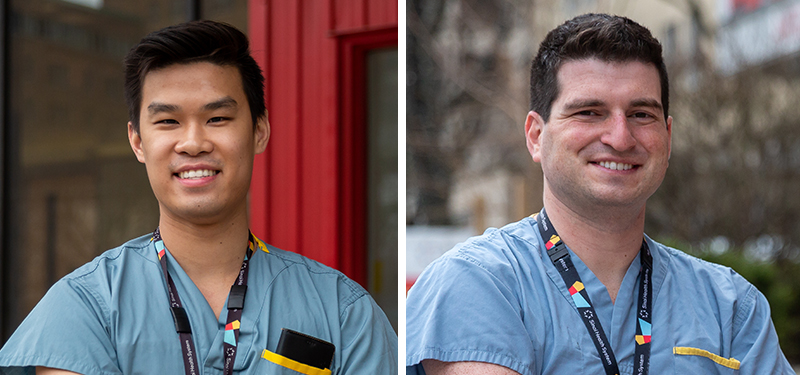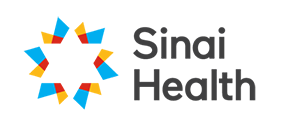
When the news of COVID-19 turned from a trickle to a wave, health care workers everywhere stepped up with courage and determination to treat those who were impacted by the disease. Close to home, Drs. Bernard Ho and Elliot Lass, University of Toronto family medicine resident physicians at Mount Sinai Hospital, were two of the many residents who raised their hands to help support patients and the hospital.
“It was the week that the pandemic was declared by the World Health Organization in March, and I was on a sports medicine rotation. I received a text from our program director, asking if I could help to assess patients with concerns of having COVID-19 in the Emergency Department,” says Elliot. “Before that day, I had never seen a patient with COVID, but I had learned a lot about the virus on the news, through medical journals, through communication from preceptors and great training from Infection Prevention and Control, which helped prepare me for what was to come.”
Inside the COVID-19 Assessment Centre at Mount Sinai Hospital, Bernard and Elliot were among the front-line workers performing assessments. While this work was not part of their expected residency, both doctors embraced a leadership role in growing our assessment capacity and establishing care pathways for the community and fellow health care providers.
Senior residents like Bernard and Elliot are coming to the end of their family medicine residencies. “Living and working through a pandemic is hard on everyone, in different ways,” notes Elliot and Bernard’s supervisor, Dr. Erin Bearss, Family & Emergency Physician and Associate Chief, Family Medicine – Academic & Special Programs. “To see our residents rise to the occasion makes me especially proud.”
Across the hospital, people are stretched beyond their normal expected work. But this can also present incredible opportunities for resident physicians to continue to learn.
“This pandemic has emphasized the fact that as general practitioners, we should still practice medicine holistically and be aware of our patients’ social situations,” explains Bernard. “One way I’ve tried to help is by collaborating with another resident and our social workers to create an info sheet of social resources for seniors, single-parents, those struggling with mental health and other challenges, for distribution in the assessment centre.”
Elliot adds, “I have learned about effective interprofessional collaboration and the importance of having effective leadership in times of need, which I have seen all around me. I have witnessed all of my family medicine resident and staff colleagues step up and provide service with dignity and compassion towards their patients.”
They both acknowledge the uncertain times they are working in.
“When things get a bit hectic, I look around and I’m reassured by seeing the number of people who are willing to help out,” says Bernard. “Across the hospital, we really feel that the safety of front-line staff is a priority, and I’m able to put my trust in my colleagues who are all doing their part.”
